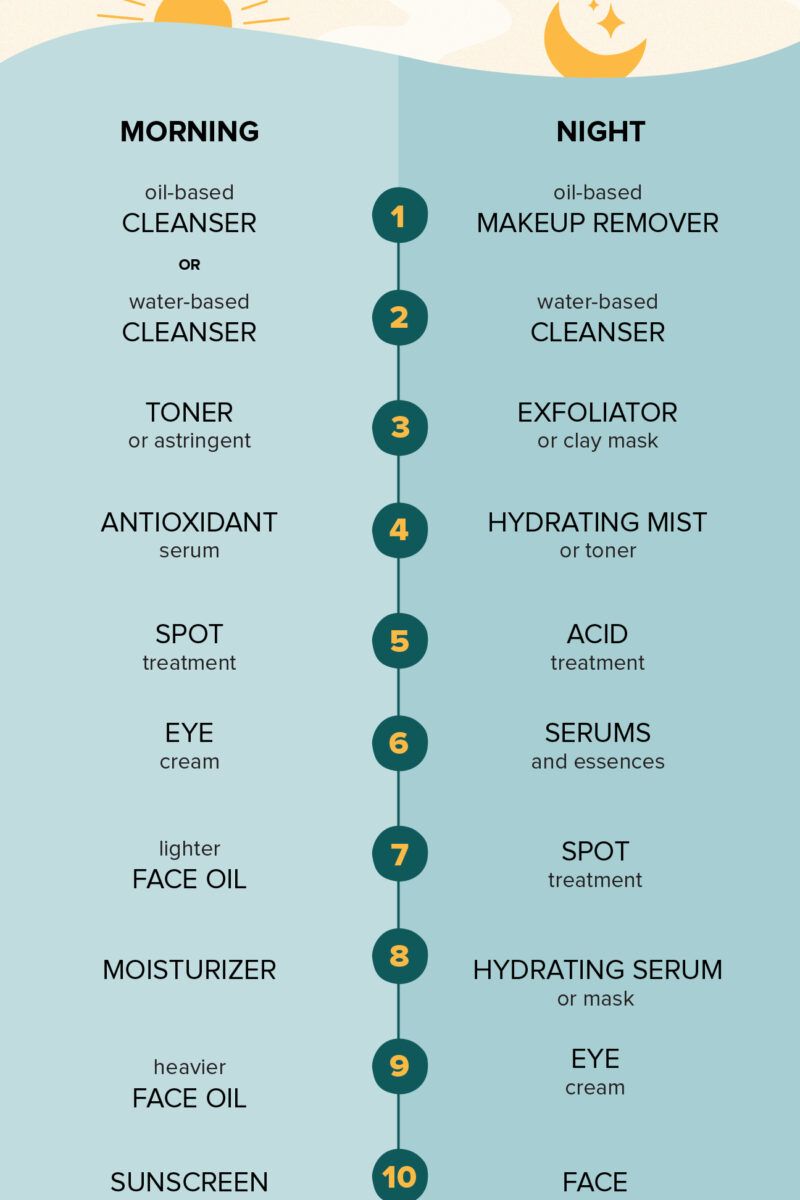When is The best time to do skin care is typically in the morning and at night. Consistency in your daily routine is crucial for optimal results.
Embarking on a comprehensive skincare regimen can significantly enhance the health and appearance of your skin. By establishing a dedicated daytime and nighttime routine, you help protect your skin from various external aggressors during the day and assist its natural repair processes at night.
Morning skin care prepares your skin to face the day, focusing on protection from the sun and environmental pollutants. On the other hand, evening routines are about deeply cleansing and providing nourishing ingredients that work in tandem with the skin’s nightly regeneration cycle. Tailoring these routines to your unique skin type and concerns, as well as applying products in the correct order, are fundamental steps towards achieving a radiant complexion. Remember, regularity is as important as the products themselves for maintaining the skin’s health and vitality.

Credit: intothegloss.com
Circadian Rhythms And Skin Health
Think of your skin as a clock, with its own schedule for repair and renewal. Circadian rhythms, our biological cycles, play a crucial role in skin health. They dictate when skin cells regenerate and defend against damage. Aligning skin care routines with these cycles may boost complexion, texture, and skin vitality. Let’s dive into the science of our biological clocks and how they influence skin.
The Science Of Biological Clocks
Our bodies follow a 24-hour cycle known as the circadian rhythm. It responds to cues from sunlight and darkness, affecting our sleep, mood, and yes – even our skin. The circadian rhythm coordinates with skin cells to signal when it’s time for repair or protection. During the night, skin cells focus on healing. By day, they work hard to shield us from harmful environmental aggressors.
How Circadian Rhythms Affect Skin
Skin has its peak times for different functions. Understanding this can optimize your skin care strategy. Take a look at how the circadian rhythm impacts skin:
Using bullet-points to list down the ways Circadian Rhythms affect skin- Overnight – Cell regeneration and repair kick into high gear.
- Morning – Skin prepares to protect itself from UV rays and pollution.
- Evening – Moisture loss increases, making it the best time for hydrating products.
Apply nighttime products to support repair and morning products to build a protective barrier. Doing so aligns with your skin’s natural schedule for optimal health. Remember, sync your skin care routine with your biological clock for the best results.

Credit: www.healthline.com
Morning Skin Care Rituals
Embracing a dedicated morning skin care routine sets the tone for your day. A good skin regimen helps protect and refresh your complexion. Start each day with rituals tailored for your skin’s needs. Think of your morning routine as a way to wake up your skin. You’ll be safeguarding it from daily environmental stressors.
Cleansing To Kickstart The Day
Begins with cleansing, the first step to clear skin. Cleansing in the morning remove oils and toxins that build up overnight. Always choose a gentle cleanser to avoid skin irritation. Splash lukewarm water on your face. Apply cleanser using circular motions. Rinse well. Pat your skin dry with a soft towel. This ritual banishes impurities and leaves skin fresh for the day ahead.
Sun Protection Essentials
Never skip sun protection in your morning routine. Ultraviolet rays can harm your skin even on cloudy days. Apply a broad-spectrum sunscreen every morning. Look for SPF 30 or higher. Sunscreen shields your skin from premature aging and hyperpigmentation. Remember to cover all exposed areas. Reapply every two hours if spending time outdoors. Stay sun-safe and your skin will thank you for years to come.
Nighttime Nourishment For Skin
Your skin does its best healing at night. Let’s unlock the secrets to making the most of these precious hours. Say goodnight to tired skin and wake up to a refreshed complexion.
Restorative Power Of Sleep
Think of sleep as a magic elixir for your skin. During these quiet hours, your body works hard to repair itself. Cells regenerate, and damage from the day begins to heal. This makes sleep a critical time for skincare. Essential processes kick into high gear, like increased blood flow and collagen production.
- Blood flow enhances your glow.
- Collagen fights wrinkles and fine lines.
- Cell turnover means fresher skin.
Stick to a regular bedtime and ensure you get 7-9 hours of quality sleep.
Overnight Treatments And Serums
With your skin in recovery mode, nighttime is perfect for special treatments. Apply serums and creams before hitting the pillow. These products work in sync with your skin’s natural repair cycle. They penetrate deeper and work better without interference from the sun or makeup.
| Treatment Type | Benefits |
|---|---|
| Roserhip Oil | Rich in vitamins, it nourishes. |
| Hyaluronic Acid | It hydrates and plumps skin. |
| Retinol | Speeds up cell turnover, reducing wrinkles. |
Apply these products after cleansing and toning. Give them time to absorb fully. Gently massage into your skin, taking care not to tug or pull.
Choose formulas suited to your skin type. For sensitive skin, look for fragrance-free options. Always patch test new products.

Credit: www.healthline.com
Seasonal Skin Care Adaptations
Seasonal Skin Care Adaptations are vital to maintaining a healthy complexion year-round.
Our skin reacts differently as the seasons change. Customizing your skin care routine according to the season keeps it balanced and beautiful.
Summer Skin Challenges
Soaring temperatures and humidity in summer can stress your skin. Excess sweat and oil can lead to breakouts. Your skin care should adapt to tackle these challenges.
-
- Use a lightweight moisturizer to prevent clogged pores.
- Increase exfoliation to clear sweat and oil buildup.
- Sunscreen is a must to protect from UV damage.
Winter Skin Protection Strategies
In winter, cold air can strip moisture from your skin, causing dryness and flaking.
-
- Switch to a richer moisturizer to lock in hydration.
- Hydrating masks once a week maintain skin’s moisture barrier.
- Don’t forget lip care to prevent chapped lips.
Lifestyle Factors Influencing Skin Care Timing
Crafting the perfect skin care routine isn’t just about the right products. Your lifestyle choices play a crucial role too. Balance your routine with daily habits to get glowing skin. Let’s peek into how your diet, hydration, and exercise can align with your skin care for the best results.
Diet And Hydration Considerations
Food and water intake affect skin health directly. Your skin is the largest organ and reflects what you consume. Here are important tips:
-
- Drink plenty of water to keep skin hydrated from the inside out.
- Eat fruits and vegetables rich in antioxidants for skin repair.
- Avoid excessive sugar and dairy as they may trigger acne.
Time your meals and water consumption to amplify your skin care routine. Skin repair happens at night, so hydrate well and eat nutrient-rich foods in the evening.
-
- Exercise and Skin Care Synchronization
Exercise And Skin Care Synchronization
Exercise promotes blood flow, bringing nutrients to the skin. Remember these points:
-
-
- Cleanse your face before and after a workout to prevent clogged pores.
- Apply sunscreen if exercising outdoors, no matter the weather.
- Moisturize post-workout to soothe and hydrate your skin.
-
Sync your skin care routine with your workout schedule for optimal skin health. Early morning or evening are prime times, giving your skin a chance to breathe and recover.
Frequently Asked Questions Of When Is The Best Time To Do Skin Care
When Should You Apply A Daily Moisturizer?
Moisturizers are best applied to clean skin twice a day. In the morning, use it after cleansing to protect your skin from daily environmental factors. At night, apply it post-cleansing to support skin hydration and repair during sleep.
Is Nighttime Skincare More Effective?
Yes, nighttime skincare is highly effective due to the skin’s regeneration process being more active at night. Products like serums and retinoids benefit from the absence of sun exposure and work well with the skin’s natural healing cycle.
Can Applying Sunscreen Be Part Of Everyday Skincare?
Applying sunscreen is a critical part of daily skincare, regardless of weather conditions. Sunscreen should be used every morning, as it protects against harmful UV rays that can cause premature aging and increase the risk of skin cancer.
Should You Cleanse Your Skin In The Morning?
Cleansing your skin in the morning is important to remove oils and residues that accumulate overnight. It provides a clean base for further skincare products and makeup, optimizing their effectiveness and adherence to the skin.
Conclusion
Determining the ideal timing for skincare isn’t just about following a set schedule. It’s about listening to your skin’s needs and adapting your routine accordingly. Mornings are great for protective ingredients, while evenings offer a chance for repair and rejuvenation.
Ultimately, consistency is key, so find a rhythm that works for you and stick with it. Healthy skin is a daily commitment!




